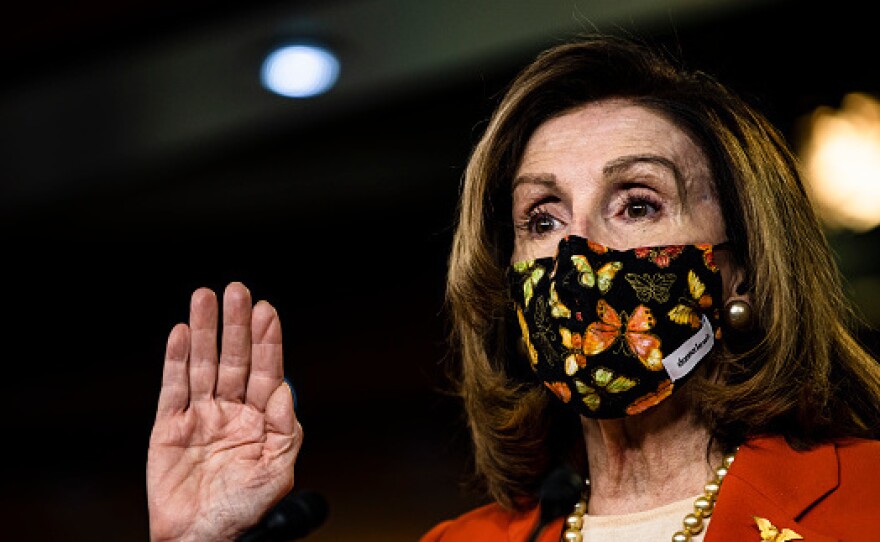Updated at 1:52 p.m. ET
As thousands of National Guard troops buttress security in Washington ahead of Wednesday's inauguration, House Speaker Nancy Pelosi has asked retired Lt. Gen. Russel Honoré to lead an investigation into security at the Capitol complex following the Jan. 6 riot.
"We must subject this whole complex to scrutiny," Pelosi said.
Pelosi, D-Calif., pointed to Honoré's experience responding to Hurricane Katrina and his knowledge of the Washington, D.C., region. Various House committees are also gearing up investigations related to the U.S. Capitol Police and the response from the Defense Department and others to the insurrection.
Pelosi noted she has been in touch with the secretary of the Army and the head of U.S. Secret Service to ensure that all requests for reinforcements from the Capitol Police for security around the inauguration are met. She pointed out that for weeks the inauguration would be a smaller ceremony due to the coronavirus pandemic. "This is not a concession to the terrorists," she said. "It is a recognition of the danger of COVID."
The speaker said security needs should be based on intelligence from law enforcement, but "redundancy may be necessary," adding there should be "not too much, but enough" to meet possible threats.
The day after the attack the top security officials at the Capitol — the House sergeant-at-arms, Paul Irving, and the Senate sergeant-at-arms, Michael Stenger — resigned their posts after requests from top leaders of both parties. U.S. Capitol Police Chief Steven Sund resigned his position hours after Pelosi and others called for his removal.
The following day, Pelosi said she had not talked to Sund when she called for him to step down.
"And I think Mr. Sund – he hasn't even called us since this happened," Pelosi told reporters. "So, I have made him aware that I would be saying that we're calling for his resignation."
An aide to Pelosi later clarified she was referring to the hours since the last conversation with Sund, which occurred early in the evening Jan. 6.
In an interview with NPR, Sund said he spoke with the speaker three times on Jan. 6, including a call with top leaders about reconvening in the House and Senate to continue the count of the electoral votes.
"It was very chaotic that evening, I know. I can only imagine just how busy Speaker Pelosi was that night. I know I had been on at least three phone calls with her," he said.
One phone call occurred at 6:25 that evening, when Sund says he spoke to Pelosi and Senate Majority Leader Mitch McConnell to coordinate their returns back into their respective chambers.
Sund told NPR on Friday that he increasingly believes the insurrection was part of a coordinated, planned attack on the Capitol. Specifically, Sund now believes that reports of pipe bombs planted at the headquarters of the Republican National Committee and the Democratic National Committee in southeast Washington were part of an effort to distract police as the violent mob approached the Capitol complex.
Sund said moments before those reports came through, he was in the operations center for Capitol Police and watching the rally with President Trump at the Ellipse.
"We had the volume up a little bit so I can kind of hear what was going on, listening for anything — anything that was going on down there," Sund said. "When we had the two pipe bombs that we've been handling, we had to turn the volume down to, you know, again, to direct our attention toward the first pipe bomb that was over at the Republican National Committee."
The FBI has said the first pipe bomb was reported at 1 p.m. local time at the RNC in southeast Washington, followed by a report of a second pipe bomb at the DNC at 1:10 p.m. A suspect in that case has not be identified.
"I think that's all part of the concerted and coordinated efforts that led to the violent attack," Sund said. "Those were diversionary tactics to pull resources away from the Hill in advance of that attack, I honestly believe that."
Sund said he believes new information has since been released by the FBI, and others, that signaled this could have been part of a coordinated attack.
"This was not a demonstration. This was not a failure to plan for a demonstration. This was a planned, coordinated attack on the United States Capitol."
Asked about allegations that some members of Congress were potentially linked with those involved in the attack, Pelosi said lawmakers have to trust that their colleagues respect each other and their oath of office.
"If, in fact, it is found that members of Congress were accomplices to this insurrection, if they aided and abetted the crime, then there have to be actions taken beyond the Congress and in terms of prosecution for that," she said. No evidence has been presented from those Democratic lawmakers making accusations about possible links from members to the extremists involved in the attack.
The speaker noted the swift action by the House of Representatives, voting to impeach Trump for one article of "incitement of insurrection" one week after the attack. Pelosi declined to answer when she would send the article of impeachment to the Senate to start the process of a trial.
Copyright 2021 NPR. To see more, visit https://www.npr.org.






